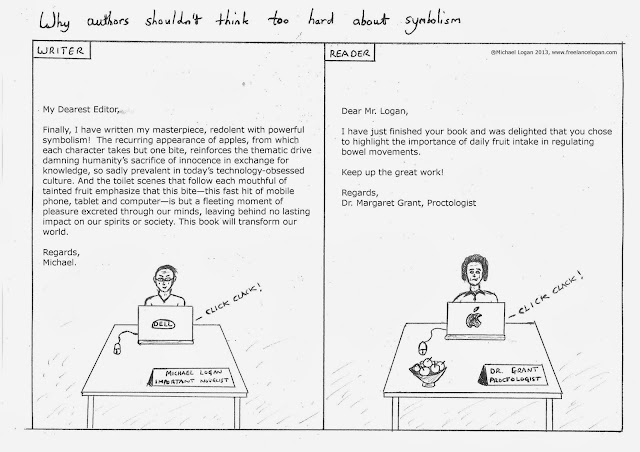I love this story about a young student who wrote to authors asking them about their use of symbolism in their work.
What I find more often than not is that when I finish a piece of work and give it a last read, I discover many happy accidents of symbolism—which means my subconscious has been churning away and doing the work for me. Not that it particularly matters, in my view, as what I write and what somebody reads are two completely different entities.
Ray Bradbury told the student that each story is a Rorschach test, and I couldn’t agree more. People who read my work either credit me with too much intelligence or insight (something those who know me personally never do), or discredit me with far too much cynicism and downright nastiness. Always, though, these statements are made is if they are fact, which says a lot about the way every one of us is locked into our own subjective narrative of “truth”.
Every reader (myself included) comes with their own set of experiences, assumptions and prejudices, and I believe we often approach a book with a pre-defined theory of what it is going to be about. And so, we then look for evidence to prove our theory: inflating the importance of passages or imagery that back it and conveniently ignoring those that do not. When that theory can’t be proven, it often seems to prompt a strong visceral reaction: ‘Because this book wasn’t what I thought it was going to be, it is a terrible book.’ Or even worse, your symbolism is misinterpreted, as is the case with our fictional proctologist above who can only see a treatise on bowel-cancer prevention (which is a worthy goal folks, and something more authors should base thrilling plots upon) in my astounding work of literary genius.
As a reader, I try to come to a book with as few preconceived ideas about it as possible, particularly since publishers’ marketing pitches can be off kilter and lead me to expect one thing when in fact I am going to get another. With this strategy, I can judge a book for what it is, rather than for what it isn’t. But that’s just me, and even then I can completely misread a book.
Anyway, this all just goes to show that you can’t write a book with a certain set of readers in mind, because they are all individuals. Write for yourself and for the story, and let the readers make of it what they will.
